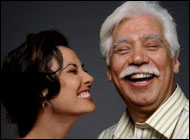If you’re happy and you know it… you’re probably old!
In what will be of a great comfort to the senior members of the community the idea that the young are the most likely group to be the happiest is a misconception.
The misconception is in fact a commonly accepted belief, but according to the authors of a new study, it is not true.
Heather Pond Lacey, PhD. of the University of Michigan Medical School’s Center for Behavioral and Decision Sciences in Medicine, and the lead author of the study, says people have got it wrong when they believe that most people become less happy as they age, and this study along with others shows that people tend to become happier over time.
Lacey says our culture encourages us to think of old age as a time of helplessness, disability, loneliness and isolation, none of which are necessarily true, and not only do younger people believe that older people are less happy, but older people believe they and others must have been happier ‘back then’, but neither belief is accurate.
For the new study an online survey was used which asked six questions, focusing on current, past and expected future levels of happiness of varying age groups and races, on how happy and content they were with their lives. 
The subjects were asked to rate their levels of happiness on a scale of 1 to 10, with 10 being the happiest.
Of the 542 participants, 273 were between the ages of 21 and 40 years, while 269 fell in the 60 to 86 age group.
Around 50 per cent of the respondents, which included African Americans and Hispanics, were females.
They were asked to rate their own current, past and expected future levels of happiness and were also asked to say how happy they thought the average 30-year-old and 70-year-old would be.
Peter Ubel MD senior author of the study says people often believe that happiness is a matter of circumstance, that if something good happens, they will experience long-lasting happiness, or if something bad happens, they will experience long-term misery.
But says Ubel, people’s happiness results more from their underlying emotional resources which appear to grow with age and people become better at managing life’s ups and downs, and as a result as they age, they become happier despite objective circumstances, such as their health declining.
Lacey says it is not that people overestimate their happiness, but rather that they learn how to value life from adversities such as being sick and lessons the sick learn from being sick, the rest of us reach over time.
The researchers say that older people are happier and more contented with life than their younger counterparts and their results showed that the average level of happiness among those in the 21-40 group was 6.65 but among those between 60 and 86 was 7.32.
Lacey says stereotypes about aging being an unhappy time of life are not correct and older people have a lot of good times to look forward to.
The authors admit that the study was however limited in that it surveyed seniors who were internet users, and so, were probably financially secure and possibly excluded those who are reclusive and ailing.
The results of the study are published in Journal of Happiness Studies.
Revision date: July 9, 2011
Last revised: by Dave R. Roger, M.D.